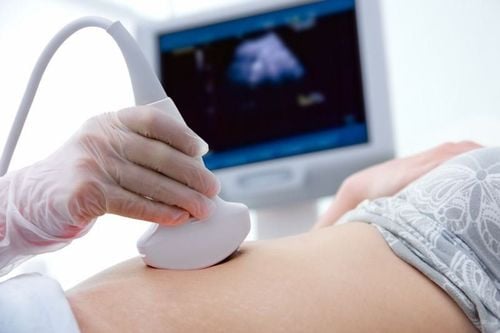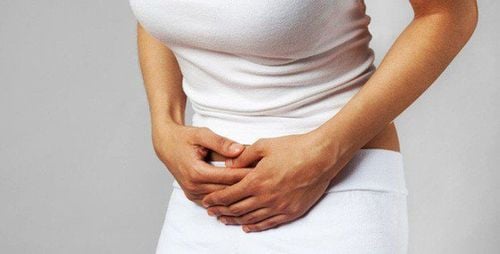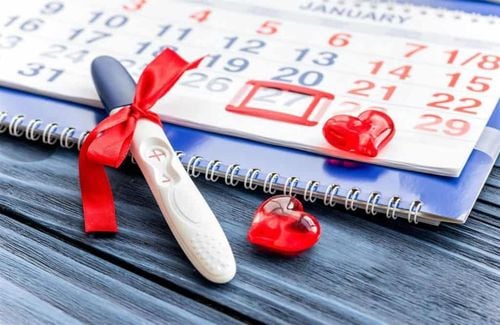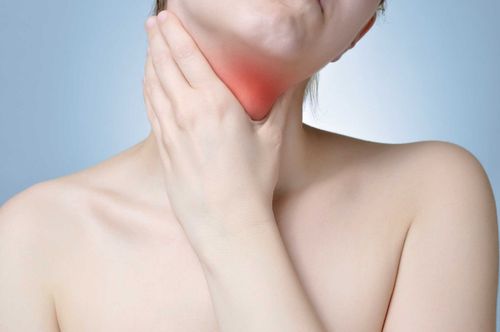This is an automatically translated article.
The article was written by MSc Vu Duy Chinh - Rehabilitation Doctor - Unit of Regenerative Medicine Clinic and Educational PsychologyUrinary retention in postpartum women is a condition of urinary tract dysfunction, the patient loses the ability to empty the bladder on its own when the bladder is full of urine. This is one of the common problems encountered in women after vaginal birth, interventional delivery or cesarean section. According to the medical literature, about 11-14 % of women after giving birth suffer from this condition.
After giving birth, the patient has a feeling of needing to urinate but can't go, tension in the lower abdomen, examination of the patient with a distended bladder bridge. Sometimes the patient does not feel the need to urinate after giving birth, because postpartum patients often wear diapers and still have pain in the pelvic floor, or because there is still the effect of the anesthetic so the patient does not feel, or feel. the need to urinate and urinate.
The condition of urinary retention and bladder bridge can be accidentally detected when giving the mother an ultrasound to evaluate the postpartum status, then usually the bladder has dilated to contain a lot of urine, there are cases where the patient's bladder contains a large amount of urine. to > 2 liters of urine before being detected and a catheter is placed to drain the urine.
Postpartum urinary retention, if detected early and treated, is usually not dangerous, but causes many motor and sensory discomforts for the mother, especially the mother who has just gone through the childbirth process and has emotional and psychological changes. However, if urinary retention is accompanied by a decrease or loss of the feeling of needing to urinate after birth, which is not detected and intervened in time, it can lead to the risk of bladder rupture, postpartum bladder block, which makes it worse. increased urinary incontinence.
We need to understand the medical condition of postpartum urinary retention in pregnant women to have preventive measures as well as active treatment to help the mother avoid pain and discomfort and avoid risks. unfortunately can happen.
1. Causes of urinary retention after birth

During labor, especially in cases of prolonged labor, when the fetal position is low, usually the fetal head will press on the bladder neck or urethra, causing urine stagnation, causing the bladder to stretch. When stretched too much, it loses tone, causing bladder neck muscle spasm. Another reason is that in the case of having to cut the episiotomy during childbirth to help the baby's head come out easily, after giving birth, stitches have to be sewn up, making the perineum swell, making the mother not dare to push when urinating. painful urination, which also makes it more difficult to pass urine. In addition, after childbirth, the mother's bladder is less sensitive to stimuli when the urine is full, which also contributes to urinary retention. The insertion of intermittent urinary catheters many times when urinary retention after birth causes cystitis, making the symptoms of urinary retention more obvious. Other less common causes can also contribute to postpartum urinary retention: pelvic nerve damage during the postpartum period, epidural anesthesia reduces sensation in the lower abdomen, thereby temporarily affecting the abdomen. bladder irritation sensation.
Clinical Manifestations of urinary retention after birth usually appear after the baby is born about 3-4 hours onwards, the mother has a feeling of needing to urinate but cannot urinate on her own. Examination revealed that the abdomen was soft, the area below the navel was hard, the upper part of the uterus was firm, there was another softer sphere that was the bladder, pressing on the feeling of tightness, feeling of tightness. and increased discomfort if the patient is unable to urinate. In some women who have decreased sensation of the bladder wall after giving birth due to one of the reasons mentioned above, the patient will not feel the need to urinate and it is not clear from birth to time. whether the examined point has urinated because the patient wears a diaper and has decreased perception of this problem. At this time, when examining the lower abdomen, the pregnant woman will also have a bladder bridge over the pubic bone, but the woman does not feel discomfort or pain. Abdominal ultrasound is very necessary and important to evaluate the status of the uterus, bladder and urine volume at the time of examination, thereby providing appropriate treatment.
2. Postpartum urinary retention treatment
Practice early urination in the presence of urine to recreate the reflex by inserting a urinary catheter, removing the clamp every 4 hours, when emptying the urine, the mother pushes to urinate through the catheter, can be combined with a compress Warm the lower abdomen, drink plenty of water. Time to place a urinary catheter lasts 2-4 days, depending on the patient's condition. Use supportive drugs: use antibiotics to fight infections, anti-inflammatory drugs to prevent swelling and compression of the bladder neck, drugs to support bladder tone to help bladder contractions return to normal: prostigmin, xatral . Exercise biofeedback and electrical nerve stimulation: these are two effective methods of urinating training for postpartum women with urinary retention, helping them to recover quickly. This method is especially useful for cases of urinary retention after childbirth due to pelvic nerve damage of postpartum women, decreased sensation, decreased bladder wall tone, and restored sensation in the lower abdomen due to impact. side effects of anesthetics. Thereby helping the mother feel the need to urinate again, strengthening the bladder wall muscles to make urination convenient and easy. One of the units that is very experienced in applying biofeedback training combined with anal electrical stimulation to treat urinary retention and other urinary disorders after birth is Vinmec Times City General Hospital. Many women with urinary disorders have been successfully examined and treated here.
Unit of Regenerative Medicine Clinic and Educational Psychology of the Center for Regenerative Medicine, Vinmec Times City International General Hospital is one of the prestigious addresses in the treatment of urinary disorders with physical therapy. Whether.
Not only owns the most modern medical equipment (room for treatment of urinary tract disorders by pulse electricity, Biofeedback, anorectal pressure measurement room...) Education and training psychology also has a team of experienced, dedicated and passionate doctors and medical staff, including:
Master, Doctor Vu Duy Chinh: Over 17 years of experience in examining and treating diseases pathology specialized in Physiotherapy/Rehabilitation, especially pathology in the fields of: Neurology, Trauma and Pediatrics... Dr. Le Thu Huong : Nearly 5 years of experience in this specialty. Rehabilitation. In 2017, Dr. Huong obtained the degree of Resident Doctor of Rehabilitation. Doctor Bui Thi Hang: 8 years of experience in Pediatrics. In 2013, Dr. Hang obtained a resident doctor degree and a master's degree in pediatrics. If you have a need for consultation and examination at Vinmec Hospitals of the national health system, please book an appointment on the website for service.
Please dial HOTLINE for more information or register for an appointment HERE. Download MyVinmec app to make appointments faster and to manage your bookings easily.
3. Measures to take after giving birth to prevent urinary retention

Pregnant women need to exercise soon after giving birth. Actively drink lots of water. Do not hold or hold urine when there is a feeling of needing to urinate due to pain after childbirth, encourage women to take the initiative to urinate in cases of normal birth with perineal stitches. Practice normal urination in a natural urine position. Regularly clean the external genital area with gynecological hygiene wash water, keep it dry, avoid infection of the perineal suture. Adequate and reasonable nutrition helps to restore the health of pregnant women after giving birth. When mothers see urinary retention or abnormal signs after giving birth, they should immediately notify the doctor/medical staff for early advice and treatment to avoid possible complications.














